
All categories
Featured selections
Trade Assurance
Buyer Central
Help Center
Get the app
Become a supplier

(6636 products available)

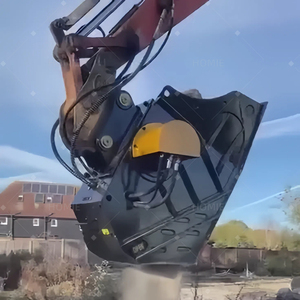







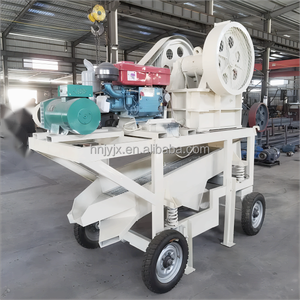







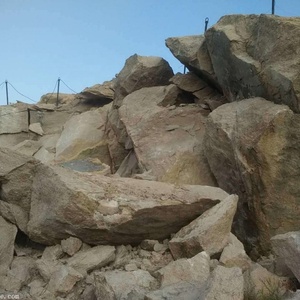
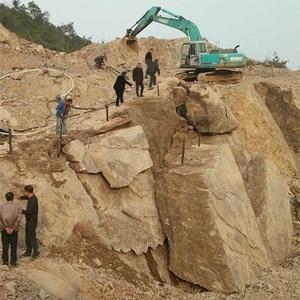

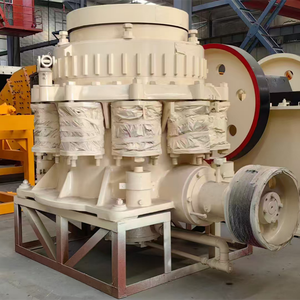
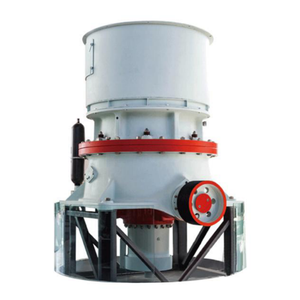
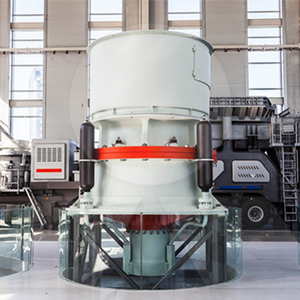


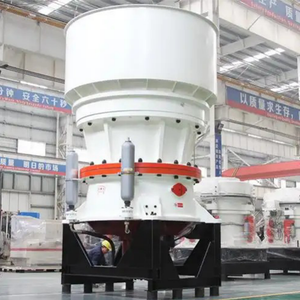







A hydraulic rock crusher is a piece of equipment designed to crush rock. This piece of equipment belongs to the large mining equipment family and is often used to break and level rock into smaller pieces. A rock crusher provides a useable and leveled site as it breaks down the large rocks.
The following are types of crushers that help break down rocks:
Hydraulic Jaw Crusher
A jaw crusher functions by allowing stone and rock material to pass through two plates. This crushing equipment is formed by a movable plate and a fixed plate. The plates compress and break the material that is fed into the machine. The hydraulic function of the jaw enables it to produce more power while exerting less effort. The hydraulic part relieves any stress that is put on the machine's parts by adjusting the settings of the plate's thickness.
Hydraulic Cone Crusher
A cone crusher uses a rotating oscillating motion to crush rocks and stone. Along with its motion, gravity plays a role in crushing the material into smaller pieces. A cone crusher has a bowl that holds the rock material. The cone that is within the bowl moves and crushes the material by applying pressure from above and below. A hydraulic cone rock crusher uses hydraulics to support its system. The hydraulic system has many benefits. It provides safety, helps with the adjustment, and has a lubrication system that supports and protects the machine.
Hydraulic Impact Crusher
An impact rock crusher is set apart from the other crushers because it uses the principle of impact rather than pressure to break down rock and material. The impact force comes from a high-speed rotor that is mounted horizontally within the machine. This rotor throws the rock material against an open space or anvil, further crushing it. This type of hydraulic rock crush equipment is often used to produce sand.
Regular inspection and maintenance:
It is important to regularly inspect the key parts of the hydraulic rock crusher, such as hydraulic pumps, valves, cylinders, seals, etc., to ensure that there is no wear, looseness, leakage, etc. and to deal with the problems in time.
Preservation and lubrication of hydraulic system:
Clean and lubricate the sealing components and moving parts of the hydraulic system to maintain good sealing and lubricating properties, thus preventing hydraulic oil leakage and abrasion.
Replace hydraulic oil and oil filter:
Replace hydraulic oil and oil filter regularly so that impurities and污will not be filtered into the hydraulic system, keeping it clean.
Clean up the crush:
Remove the crushed materials and impurities and dirt from the hydraulic rock crusher to prevent the heat dissipation and cooling system from being blocked, thus ensuring normal heat dissipation.
Pay attention to temperature and noise:
During operation, it is necessary to pay attention to the temperature changes of the hydraulic pump and motor, as well as the noise changes, thus detecting possible problems in time and making a shutdown for inspection.
The hydraulic rock breaker is widely used because of its efficiency in breaking hard rock and stone materials, as well as its versatility. Among the industries that use the equipment, construction tops the list. In this industry, the machines'' sizes vary depending on the task at hand. For example, a breaker weighing 1000 kg is used to demolish a massive structure or a large-scale excavation. Other typical uses include breaking rock to create a suitable foundation for a building.
In the mining industry, the portable hydraulic rock crusher is used for ore extraction. The equipment breaks large stones in mines into smaller sizes for further processing. The breaker also creates tunnels and excavations in mining sites. The hydraulic rock breaker is perfect for land reclamation and excavation projects and is commonly used in open-pit mines.
Another industry that uses the hydraulic rock breaker is the road construction industry. The machine levels surfaces by breaking large stones and rocks. It can also be used to remove old pavements to lay new ones. When dealing with massive rocks that obstruct the road, the breaker shatters the rock into smaller pieces for removal. It''s also used to create trenches for drainage and lay down pipes.
Quarries use the hydraulic breaker to reduce large volumes of hard rock into smaller sizes. The equipment boosts productivity because it''s faster and more efficient than other methods. The smaller rock sizes are used in various industries to make concrete, asphalt, and for filtration, among other uses.
Landscapers mainly use small hydraulic rock crushers. They pave the way for creating landscapes and hardscapes. Hydraulic rock crushes are great for dealing with stubborn rocks that can''t be removed manually.
When it comes to selecting a hydraulic rock crusher for sale, a number of things need to be taken into consideration to make sure it meets purpose and reduces the level of maintenance costs.
Capacity and dimensions
Capacity is the amount of material in volume or weight that a machine can process per time. In the case of crushers, capacity is usually given in tons per hour (TPH). It ranges from 20T to 40T per hour for small models, 40T to 100T for medium models, and 100 to 200T or more for big models. With respect to capacity, dimension also plays a key role. The feed opening and the overall size of the machine also need to fit the rock size one needs to break. In addition to fitting the rocks, the dimensions of the crusher also need to fit those of the plant.
Power Source
A rock crusher's power source is what drives the engine performing the main functions. Power sources can be electric motors, diesel or natural gas engines, hydraulic motors from excavators, or a combination of these. Crushers using electric motors as their primary source may need high-voltage electricity on-site. If that is not feasible, diesel engines are used to provide the necessary power. Hydraulic motors are used for mobile crushers that derive their power from excavators.
Availability of Spare Parts
When embarking on choosing hydraulic rock crushing equipment, the availability of spare parts should also be taken into consideration. It is important to inquire about the suppliers or those who have used the equipment in the past and their experience in sourcing spare parts. Suppliers who provide a timely response and excellent customer support should also be preferred. Suppliers with a strong technical team should also be considered.
Application
Rock crushers are used in different application areas. The mining industry uses them to break ore such as gold, copper, and iron to extract those minerals. It may also need crushers to process raw material for construction projects.
Investment Cost
The kind of rock crusher equipment that one buys will depend on the investment cost. With small projects, it may be more viable to rent a piece of equipment rather than buy it. Rented pieces would be maintained by the rental company, and it would free up capital for other more important areas. With large-scale projects that need continual crushing of rock, it may be more cost-effective in the long run to buy the piece of equipment.
Q1: How does a hydraulic rock crusher work?
A1: A hydraulic rock crusher utilizes the hydraulic system to work with the mechanical principle to crush the hard rocks. The force generated by the hydraulic fluid power crushes the rocks.
Q2: What are the benefits of using hydraulic rock crushers?
A2: The hydraulic rock crushers offer several advantages. They provide better control over the size and shape of the crushed rock. They can also handle a wide variety of materials. In addition, the hydraulic rock crushers have the ability to self-regulate and adjust their crushing pressure, which reduces the need for manual intervention. The machines are also faster crushing rates.
Q3: What types of hydraulics rock crushers are there?
A3: There are mainly four types of hydraulic rock crushers. They are cone crushers, impact crushers, gyratory crushers, and mono-block crushers.
Q4: Can a hydraulic rock crusher be used in wet conditions?
A4: Using a hydraulic rock crusher in wet conditions is not recommended. The moisture in the air can lead to rust and erosion of electrical components and mining equipment. If it is necessary to use the machine in a moist climate, it's critical to take protective measures, such as moisture-proof and water resistant.